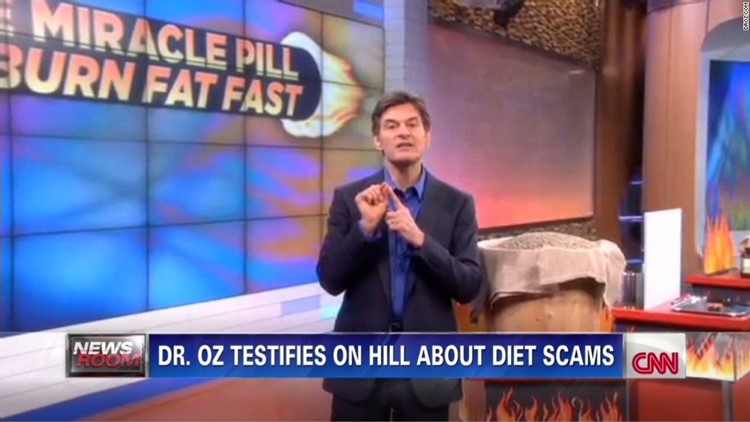(CNN) — Dr. Mehmet Oz, host of “The Dr. Oz Show,” faced grilling by senators on Capitol Hill about the promotion of weight loss products on his show.
Sen. Claire McCaskill, chairwoman of the Subcommittee on Consumer Protection, Product Safety and Insurance, led the panel that on Tuesday looked at false advertising for weight loss products. Subcommittee members took issue with assertions that Oz has made on his show about products that don’t have a lot of scientific evidence to back them up, such as green coffee beans.
“The scientific community is almost monolithic against you in terms of the efficacy of the three products you called ‘miracles,’ ” said McCaskill, a Missouri Democrat. She said she was discouraged by the “false hope” his rhetoric gives viewers and questioned his role “intentional or not, in perpetuating these scams.”
“I don’t get why you need to say this stuff when you know it’s not true. When you have this amazing megaphone, why would you cheapen your show? … With power comes a great deal of responsibility.”
The Federal Trade Commission is in charge of protecting consumers from “unfair or deceptive advertising and marketing practices that raise health and safety concerns.” In May, the FTC sued the sellers of Green Coffee Beans for deceiving consumers through fake news sites and invented health claims.
The commission said that weeks after “The Dr. Oz Show” promoted the benefits of Pure Green Coffee, some companies that marketed the product used video from his show to increase sales.
The scientific evidence supporting green coffee bean extract as a weight loss supplement is weak.
A small study published in 2012 found chlorogenic acid, the main ingredient in green coffee beans, helped 16 human participants lose, on average, 18 pounds over 22 weeks. But another study on chlorogenic acid in mice found that the acid did not help mice lose weight and in fact, increased their insulin resistance.
A 2011 meta-analysis of three studies on green coffee extract found the supplement produced, on average, a five-pound loss among study participants. But all three studies were short term and included a small number of participants, leading the meta-analysis authors to conclude: “More rigorous trials are needed to assess the usefulness of GCE as a weight loss tool.”
Oz told the panel that he does use “flowery language” to describe certain products on his show but added he believes in them so much he has given them to his family.
“My job, I feel, on the show is to be a cheerleader for the audience, and when they don’t think they have hope, when they don’t think they can make it happen, I want to look, and I do look everywhere, including in alternative healing traditions, for any evidence that might be supportive to them,” Oz said.
In addition to green coffee beans, McCaskill called out Garcinia cambogia as another weight loss product Oz has promoted.
“Thanks to brand new scientific research, I can tell you about a revolutionary fat buster,” Oz said on his show in November 2012 with the words “No Exercise. No Diet. No Effort” on the screen behind him. “It’s called Garcinia cambogia.”
A 1998 study of 135 participants found Garcinia cambogia did not significantly help people lose weight any more than a placebo. But a 2013 meta-analysis of Garcinia cambogia studies hedged on the supplement’s ineffectiveness, saying its weight loss benefits “remain to be proven in larger-scale and longer-term clinical trials.” Whether it helps people lose weight or not, the Garcinia cambogia does not seem to be unsafe to use, some other studies say.
Oz testified Tuesday that he could not be held responsible for what certain companies say online about the products. He said he’s toned down some of his language and will publish a list of products he thinks really can help people lose weight.
“To not have the conversation about supplements at all however would be a disservice to the viewer,” Oz said in a prepared statement after the hearing. “In addition to exercising an abundance of caution in discussing promising research and products in the future, I look forward to working with all those present today in finding a way to deal with the problems of weight loss scams.”
The Food and Drug Administration does not regulate weight loss supplements. Under current law, companies selling these products do not need FDA approval before marketing them to the public.
“Just because you see a supplement product on a store shelf does NOT mean it is safe or effective,” the FDA website says. “When safety issues are suspected, FDA must investigate and, when warranted, take steps to have the product removed from the market. However, it is much easier for a firm to get a product on the market than it is for FDA to take a product off the market.”
These weight loss products, even those that claim to be all natural, may contain toxic ingredients, the FDA says, or they may interact badly with other medications. Make sure to check with your doctor before taking any supplement.
The FTC told Elizabeth Cohen, CNN senior medical correspondent, that there are just “too many” weight loss products using deceptive advertising to sue them all. But consumers should be wary of certain phrases that are most certainly false, the FTC said, including any that claim to help you lose weight without diet and exercise.
Bottom line — don’t believe everything you see. Do your homework online and make sure any claim about a weight loss product is backed up by scientific evidence.



